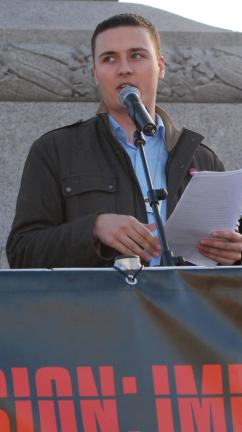Streeting hangs CUSU out to dry
Exec members accuse former President of “betrayalâ€
Former CUSU President Wes Streeting has been accused of “betraying” his former student union by current Exec members after changing his stance on the inclusion of Cambridge students in the National Student Survey (NSS). Streeting, who initiated the CUSU boycott of the survey while President in 2004-5, went before the Common’s Education Select Committee on Monday February 19 and accused the CUSU policy of “perpetuating the old school tie and secret handshake” and “doing themselves no favours”.
During his term as CUSU President Streeting promoted a policy which described the government-backed NSS as “not only harmful to student feedback mechanisms, but not useful either”. Currently NUS Vice-President (Education) and a member of the NSS Steering Committee responsible for providing “advice and planning” on the survey, Streeting has undertaken something of a volte-face. He told Varsity that the survey’s “methodology” had improved because it was “less intrusive”, adding that the inclusion of an optional “bank of questions”, which allow each university to obtain a more specific set of results, make the survey more applicable to Cambridge. “NSS results are having a direct impact on the enhancement of student experience”, he argued.
Complete betrayal, given that he led the Exec which initiated the boycott
 Streeting’s move has been met with indignation by the current CUSU Executive. CUSU Democracy Officer Jacob Bard-Rosenberg described it as “complete betrayal, given that he led the Exec which initiated the boycott”. Current CUSU President Mark Ferguson urged Streeting “to remember his past as a CUSU President,” adding “I agree with Wes’ position on a lot of things, but I am very disappointed at this”. Welfare Officer Sam Rose said that he was “sad that Wes is failing to support his old union”.
Streeting’s move has been met with indignation by the current CUSU Executive. CUSU Democracy Officer Jacob Bard-Rosenberg described it as “complete betrayal, given that he led the Exec which initiated the boycott”. Current CUSU President Mark Ferguson urged Streeting “to remember his past as a CUSU President,” adding “I agree with Wes’ position on a lot of things, but I am very disappointed at this”. Welfare Officer Sam Rose said that he was “sad that Wes is failing to support his old union”.
These reactions were dismissed as “cheap” by Streeting. “The reasons why I’ve changed,” he argued, “are that I now have responsibilities to represent over a hundred other student unions. Although I know that my personal position on the matter is the same as the official NUS mandate, the NSS was a never a main plank in my manifesto”.
NUS President Gemma Tumelty criticised the unwillingness of Cambridge students to participate in the survey. “It only exacerbates the reputation Cambridge has of being an elitist institution, somehow separate from others and affected by utterly different circumstances, which is not the case”. She believes it is “valuable” for students who enjoy such a reputation as that of Cambridge “to be able to feed into a number of organisations that make decisions on future students’ experience”.
CUSU’s stance has attracted widespread criticism in the academic community. University of Leeds Vice-Chancellor Professor Michael Arthur this week described the CUSU boycott as “a great shame,” adding “this is an opportunity for students to say what they want about institutions”. Higher Education Funding Council for England (HEFCE) spokesperson Philip Walker agreed, stating the “NSS is very important in allowing potential students to make informed decisions about which university they go to”.
Ferguson justified the continued CUSU boycott by saying that while the NSS is a “reasonable survey” for most universities, in relation to Cambridge it obtains “no meaningful data”, adding that it is “not representative of the collegiate structure”. “At the end of the day,” he concluded “we are a world class institution and our expectations are higher than those of others.”
Cambridge Pro-Vice Chancellor for Education, Professor Melveena McKendrick has told all final year undergraduates “it would be a glaring omission… for Cambridge to be the only university not to have its [NSS] results posted along with those of other institutions when prospective applicants are making comparisons”. She urged all finalists to participate in the survey.
Alice Whitwam
 News / Police to stop searching for stolen Fitzwilliam jade17 April 2024
News / Police to stop searching for stolen Fitzwilliam jade17 April 2024 News / Night Climbers call for Cambridge to cut ties with Israel in new stunt15 April 2024
News / Night Climbers call for Cambridge to cut ties with Israel in new stunt15 April 2024 Interviews / ‘It fills you with a sense of awe’: the year abroad experience17 April 2024
Interviews / ‘It fills you with a sense of awe’: the year abroad experience17 April 2024 Sport / Kabaddi: the ancient sport which has finally arrived in Cambridge17 April 2024
Sport / Kabaddi: the ancient sport which has finally arrived in Cambridge17 April 2024 Features / Cambridge’s first Foundation Year students: where are they now?7 April 2024
Features / Cambridge’s first Foundation Year students: where are they now?7 April 2024





